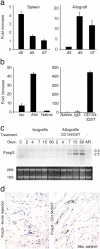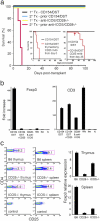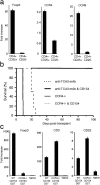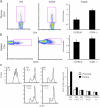Recruitment of Foxp3+ T regulatory cells mediating allograft tolerance depends on the CCR4 chemokine receptor
- PMID: 15809349
- PMCID: PMC2213137
- DOI: 10.1084/jem.20041709
Recruitment of Foxp3+ T regulatory cells mediating allograft tolerance depends on the CCR4 chemokine receptor
Abstract
Although certain chemokines and their receptors guide homeostatic recirculation of T cells and others promote recruitment of activated T cells to inflammatory sites, little is known of the mechanisms underlying a third function, migration of Foxp3(+) regulatory T (T reg) cells to sites where they maintain unresponsiveness. We studied how T reg cells are recruited to cardiac allografts in recipients tolerized with CD154 monoclonal antibody (mAb) plus donor-specific transfusion (DST). Real-time polymerase chain reaction showed that intragraft Foxp3 levels in tolerized recipients were approximately 100-fold higher than rejecting allografts or allografts associated with other therapies inducing prolonged survival but not tolerance. Foxp3(+) cells were essential for tolerance because pretransplant thymectomy or peritransplant depletion of CD25(+) cells prevented long-term survival, as did CD25 mAb therapy in well-functioning allografts after CD154/DST therapy. Analysis of multiple chemokine pathways showed that tolerance was accompanied by intragraft up-regulation of CCR4 and one of its ligands, macrophage-derived chemokine (CCL22), and that tolerance induction could not be achieved in CCR4(-/-) recipients. We conclude that Foxp3 expression is specifically up-regulated within allografts of mice displaying donor-specific tolerance, that recruitment of Foxp3-expressing T reg cells to an allograft tissue is dependent on the chemokine receptor, CCR4, and that, in the absence of such recruitment, tolerizing strategies such as CD154 mAb therapy are ineffectual.
Figures





Similar articles
-
CCR4-deficient mice show prolonged graft survival in a chronic cardiac transplant rejection model.Eur J Immunol. 2005 Jan;35(1):128-38. doi: 10.1002/eji.200324745. Eur J Immunol. 2005. PMID: 15593118
-
Production of thymus and activation-regulated chemokine and macrophage-derived chemokine by CCR4+ adult T-cell leukemia cells.Clin Cancer Res. 2005 Mar 15;11(6):2427-35. doi: 10.1158/1078-0432.CCR-04-0491. Clin Cancer Res. 2005. PMID: 15788694
-
CCR4 dependent migration of Foxp3+ Treg cells to skin grafts and draining lymph nodes is implicated in enhanced graft survival in CD200tg recipients.Immunol Lett. 2011 Dec 30;141(1):116-22. doi: 10.1016/j.imlet.2011.09.002. Epub 2011 Sep 17. Immunol Lett. 2011. PMID: 21945175
-
Chemokine receptor-dependent alloresponses.Immunol Rev. 2003 Dec;196:37-50. doi: 10.1046/j.1600-065x.2003.00084.x. Immunol Rev. 2003. PMID: 14617196 Review.
-
CCR4 as a novel molecular target for immunotherapy of cancer.Cancer Sci. 2006 Nov;97(11):1139-46. doi: 10.1111/j.1349-7006.2006.00307.x. Epub 2006 Sep 5. Cancer Sci. 2006. PMID: 16952304 Free PMC article. Review.
Cited by
-
Up-regulation of PD-L1, IDO, and T(regs) in the melanoma tumor microenvironment is driven by CD8(+) T cells.Sci Transl Med. 2013 Aug 28;5(200):200ra116. doi: 10.1126/scitranslmed.3006504. Sci Transl Med. 2013. PMID: 23986400 Free PMC article.
-
Distinct chemokine and cytokine gene expression pattern of murine dendritic cells and macrophages in response to Mycobacterium tuberculosis infection.J Leukoc Biol. 2008 Nov;84(5):1264-70. doi: 10.1189/jlb.1107742. Epub 2008 Aug 14. J Leukoc Biol. 2008. PMID: 18703681 Free PMC article.
-
Sustained suppression by Foxp3+ regulatory T cells is vital for infectious transplantation tolerance.J Exp Med. 2011 Sep 26;208(10):2043-53. doi: 10.1084/jem.20110767. Epub 2011 Aug 29. J Exp Med. 2011. PMID: 21875958 Free PMC article.
-
Differential effects of rapamycin and retinoic acid on expansion, stability and suppressive qualities of human CD4(+)CD25(+)FOXP3(+) T regulatory cell subpopulations.Haematologica. 2013 Aug;98(8):1291-9. doi: 10.3324/haematol.2012.074088. Epub 2012 Dec 14. Haematologica. 2013. PMID: 23242600 Free PMC article.
-
Metabolic Optimisation of Regulatory T Cells in Transplantation.Front Immunol. 2020 Sep 2;11:2005. doi: 10.3389/fimmu.2020.02005. eCollection 2020. Front Immunol. 2020. PMID: 33013855 Free PMC article. Review.
References
-
- Wood, K.J., and S. Sakaguchi. 2003. Regulatory T cells in transplantation tolerance. Nat. Rev. Immunol. 3:199–210. - PubMed
-
- Lee, M.K., D.J. Moore, B.P. Jarrett, M.M. Lian, S. Deng, X. Huang, J.W. Markmann, M. Chiaccio, C.F. Barker, A.J. Caton, and J.F. Markmann. 2004. Promotion of allograft survival by CD4+CD25+ regulatory T cells: evidence for in vivo inhibition of effector cell proliferation. J. Immunol. 172:6539–6544. - PubMed
-
- Sakaguchi, S., N. Sakaguchi, M. Asano, M. Itoh, and M. Toda. 1995. Immunologic self-tolerance maintained by activated T cells expressing IL-2 receptor alpha-chains (CD25). Breakdown of a single mechanism of self-tolerance causes various autoimmune diseases. J. Immunol. 155:1151–1164. - PubMed
-
- Cobbold, S.P., R. Castejon, E. Adams, D. Zelenika, L. Graca, S. Humm, and H. Waldmann. 2004. Induction of foxP3+ regulatory T cells in the periphery of T cell receptor transgenic mice tolerized to transplants. J. Immunol. 172:6003–6010. - PubMed
Publication types
MeSH terms
Substances
Grants and funding
LinkOut - more resources
Full Text Sources
Other Literature Sources
Medical
Molecular Biology Databases

